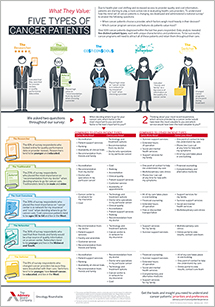Auto logout in seconds.
Continue LogoutRead Advisory Board's take: 4 ways providers can support caregivers
In the United States, caregivers face significant economic loss and stress to care for their family and friends during and after medical treatment, a fact that highlights a "gaping hole" in the U.S. health care system, Aaron Carroll writes for the New York Times' "The Upshot."
A diagnosis for the whole family
To illustrate this point, Carroll recounts what happened when his friend Jim Fleischer was treated for cancer.
"In many respects he was lucky," Carroll writes. "He had great insurance. He had enough money. Partly because one of his friends (me) is well connected in the health care system, he got excellent care."
But while Fleischer arguably experienced the U.S. health care system "at its peak performance," Carroll writes that the episode also showed him firsthand how "hugely disrupting and expensive," it was for Fleischer and his family to coordinate care.
Throughout Fleischer's diagnosis and treatment, "[s]omeone had to take the time to be with him," Carroll explains. His wife, Ali, had to take off work for "every appointment," Carroll writes. When Ali couldn't miss work, others filled in, including Carroll and his family. Fleischer is now in remission, but while he was in treatment, he missed about three months of work, and Carroll estimates that the people who cared from him missed at least 30 days of work.
"The economic loss" of missing a month of work "is the least" of a caregiver's burden, Carroll writes. "Not included is all the strain that has been put on Jim's relatives as they've shifted to care for him while still maintaining all the obligations and commitments any family of five has to deal with."
The 'unbearable' burden of caregiving is widespread
If navigating caregiving was difficult for Fleischer and his family, "it's probably unbearable for many others with fewer resources," Carroll writes.
To find out how the absence of support for caregivers might affect other patients, Carroll went on social media to find people who had survived cancer in the last few years and asked if they had similar experiences. "Most said yes," Carroll writes.
One patient, Dina Burns, missed about three months of work for surgery and chemotherapy after she learned she had Stage 2 breast cancer. "But her support team collectively missed even more," Carroll writes. Burns said her sister stayed with her for two weeks after her surgery. Burns' daughters took turns caring for her, too, and her husband attended "every appointment [and] every hospitalization." Burns' husband, she notes, "would sit in the recovery bay with his laptop, trying to stay on top of work and take care of me at the same time," Burns said.
Candice B., who has had cancer multiple times since 2004, told Carroll that her "mother stopped working entirely" when she got sick. "She lost at least three years of being in the work force over all," Candice said.
The economic burden of caregiving can cause "financia[l] rui[n]," Carroll states.
Researchers in a 2010 paper estimated that the average cost to a caregiver who was caring for a person with lung or colorectal cancer in the initial phase of treatment was more than $7,000. Roughly $20,000 more was spent on "continuing" care for the patient, Carroll writes. Another study published in Cancer in 2009 found that two-year caregiving costs exceeded $72,000 for lung cancer, $66,000 for ovarian cancer, $59,000 for lymphoma, and $38,000 for breast cancer.
Addressing the 'gaping hole' in policy for caregivers
While "Americans spend so much time debating … health care," Carroll writes, "[a]lmost none of that covers the … hardship faced by the many millions of friends and family members who are caregivers," Carroll writes. "There's no system for it. It's a gaping hole."
"Policies that address this issue are rare," Carroll writes. The U.S. Family and Medical Leave Act grants up to 12 workweeks of leave for employees to care for a family member with a health problem, "But that leave is unpaid," Carroll writes. "It also applies only to a spouse, child, or parent," Carroll notes. Similarly, the law only applies to companies with 50 or more employees—which excludes about 40% of the workforce.
"What seems more important is recognizing that the efforts of caregivers are probably just as important to health as the drugs and procedures the medical system provides," Carroll writes. "Rides to the hospital are care. The time spent at home with those recuperating after procedures is care. Watching and monitoring and caring for the ill in their home is just as much care as doing the same in a hospital," Carroll concludes (Carroll, "The Upshot," New York Times, 3/25).
Advisory Board's take

Deirdre Saulet, Practice Manager, Oncology Roundtable
This article underscores the far-reaching impact a cancer diagnosis has—not only changing the course of the patient's life, but that of their loved ones and caregivers. And while truly fixing the health care system to adequately support caregivers will require broader buy-in and policy redesign, there are steps cancer providers can take—on their own—to enfranchise and support caregivers.
Here are four ways to begin:
- Include caregivers in new patient orientation: To help set expectations about what supporting loved ones will entail, providers should engage caregivers from the start. At City of Hope National Medical Center, newly diagnosed breast cancer patients and their partners attend a clinic where they meet with clinicians and social workers who offer treatment-related education and psychological support. The goal is not only to provide critical information about what to expect, but also to teach couples strategies about how to support one another and overcome the common challenges experienced by couples dealing with a cancer diagnosis.
- Offer tailored support groups: To provide an emotional outlet and peer support, providers should consider offering support groups to both patients and their caregivers. These groups can provide a healthy outlet for caregivers specifically, who often hesitate to share their concerns or worries because they fear adding to their loved one's burden. Our research team interviewed one cancer patient who told us what her experience attending her organization's support groups with her caregiver was like. The day started with patients meeting with a social worker to discuss coping techniques and share common challenges, while caregivers met separately with a nurse to discuss caregiver-specific issues and experiences. Next, they convened for a joint group session for education on topics like nutrition or symptom management. She found the entire day to be immensely beneficial.
- Enhance support for metastatic patients and their partners: To meet the particular distress and challenges of receiving a metastatic diagnosis, providers should seek to provide more hands-on support to these patients and their families. Years ago, Johns Hopkins Hospital started offering a metastatic breast cancer couples retreat to help couples prepare for the journey ahead. The two-and-a-half-day event, which is funded by a philanthropic donor, includes networking with other couples, conversations about end of life, and an overview of current research. Activities include writing cards for their children to receive at milestone events and creating a memory ship of happy memories.
- Improve caregiver access using technology: To make sure caregivers get the support they need when they need it, organizations should explore ways to leverage technology. The Veterans Health Administration launched a Family Caregiver Pilot Program which provided iPads with pre-loaded apps to caregivers to improve their access to health information and empower them as care managers. Similarly, we recently spoke with an organization allowing patients and caregivers to opt into a text messaging program, which feeds bite-sized information on appointments, logistics, and frequently asked questions.
While these strategies won't fix the many fundamental cracks in the health care system that make caregiving particularly challenging, they will enhance the support and assistance your program offers to this critical member of the care team. To view other ways to support caregivers, read our blog here and view (or download the slides from) our on-demand webconference, Strategies to Engage Cancer Patients and Caregivers.
Don't miss out on the latest Advisory Board insights
Create your free account to access 1 resource, including the latest research and webinars.
Want access without creating an account?
You have 1 free members-only resource remaining this month.
1 free members-only resources remaining
1 free members-only resources remaining
You've reached your limit of free insights
Become a member to access all of Advisory Board's resources, events, and experts
Never miss out on the latest innovative health care content tailored to you.
Benefits include:
You've reached your limit of free insights
Become a member to access all of Advisory Board's resources, events, and experts
Never miss out on the latest innovative health care content tailored to you.
Benefits include:
This content is available through your Curated Research partnership with Advisory Board. Click on ‘view this resource’ to read the full piece
Email ask@advisory.com to learn more
Click on ‘Become a Member’ to learn about the benefits of a Full-Access partnership with Advisory Board
Never miss out on the latest innovative health care content tailored to you.
Benefits Include:
This is for members only. Learn more.
Click on ‘Become a Member’ to learn about the benefits of a Full-Access partnership with Advisory Board
Never miss out on the latest innovative health care content tailored to you.

